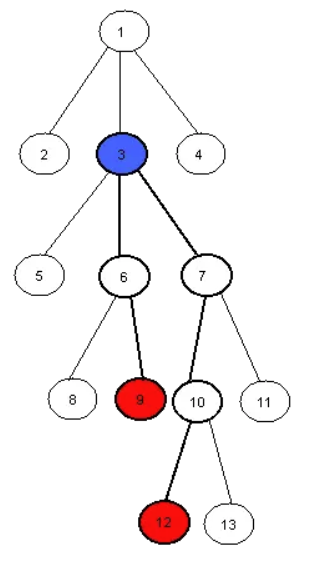LCA - Lowest Common Ancestor
https://www.luogu.com.cn/problem/SP14932
题目描述
A tree is an undirected graph in which any two vertices are connected by exactly one simple path. In other words, any connected graph without cycles is a tree. - Wikipedia
The lowest common ancestor (LCA) is a concept in graph theory and computer science. Let T be a rooted tree with N nodes. The lowest common ancestor is defined between two nodes v and w as the lowest node in T that has both v and w as descendants (where we allow a node to be a descendant of itself). - Wikipedia
Your task in this problem is to find the LCA of any two given nodes v and w in a given tree T.

For example the LCA of nodes 9 and 12 in this tree is the node number 3.
Input
The first line of input will be the number of test cases. Each test case will start with a number N the number of nodes in the tree, 1 <= N <= 1,000. Nodes are numbered from 1 to N. The next N lines each one will start with a number M the number of child nodes of the Nth node, 0 <= M <= 999 followed by M numbers the child nodes of the Nth node. The next line will be a number Q the number of queries you have to answer for the given tree T, 1 <= Q <= 1000. The next Q lines each one will have two number v and w in which you have to find the LCA of v and w in T, 1 <= v, w <= 1,000.
Input will guarantee that there is only one root and no cycles.
Output
For each test case print Q + 1 lines, The first line will have "Case C:" without quotes where C is the case number starting with 1. The next Q lines should be the LCA of the given v and w respectively.
Example
Input:
1
7
3 2 3 4
0
3 5 6 7
0
0
0
0
2
5 7
2 7Output:
cpp
Case 1:
3
1输入格式
无
输出格式
无
代码
倍增算法
cpp
#include <bits/stdc++.h>
#define endl "\n"
using namespace std;
vector<int> dep; // 存储深度
vector<vector<int>> fa; // 存储跳跃点
vector<vector<int>> e; // 存储边
void dfs(int x, int y) {
for (int i = 1; i <= 9; i++) {
fa[x][i] = fa[fa[x][i - 1]][i - 1];
}
for (auto i : e[x]) {
dfs(i, x);
}
}
int lca(int u, int v) {
if (dep[u] < dep[v]) swap(u, v);
for (int i = 9; i >= 0; i--) {
if (dep[fa[u][i]] >= dep[v]) u = fa[u][i];
}
if (u == v) return v;
for (int i = 9; i >= 0; i--) {
if (fa[u][i] != fa[v][i]) {
u = fa[u][i];
v = fa[v][i];
}
}
return fa[u][0];
}
void solve() {
int N; // 节点数
cin >> N;
dep = vector<int>(N + 1);
fa = vector<vector<int>>(N + 1, vector<int>(10, 0));
e = vector<vector<int>>(N + 1);
dep[1] = 1;
for (int i = 1; i <= N; i++) {
int sonNum; // 子节点数量
cin >> sonNum;
while (sonNum--) {
int sonNode;
cin >> sonNode;
e[i].push_back(sonNode);
fa[sonNode][0] = i;
dep[sonNode] = dep[i] + 1;
}
}
dfs(1, 0);
int queryNum;
cin >> queryNum; // 查询次数
while (queryNum--) {
int u, v;
cin >> u >> v;
cout << lca(u, v) << endl;
}
}
int main() {
ios::sync_with_stdio(false);
cin.tie(nullptr);
int T;
cin >> T;
for (int i = 1; i <= T; i++) {
cout << "Case " << i << ":" << endl;
solve();
}
return 0;
}tarjan算法
cpp
#include <bits/stdc++.h>
#define endl "\n"
using namespace std;
vector<bool> vis; // 存储是否访问
vector<int> fa; // 存储父节点
vector<vector<int>> e; // 存储子节点
vector<vector<pair<int, int>>> query; // 需要查询的
vector<int> ans; // 存储答案
int find(int x) {
if (x == fa[x]) return x;
return fa[x] = find(fa[x]);
}
void tarjan(int x) {
vis[x] = true;
for (auto son : e[x]) {
if (!vis[son]) {
tarjan(son);
fa[son] = x;
}
}
for (auto q : query[x]) {
int y = q.first, id = q.second;
if (vis[y]) {
ans[id] = find(y);
}
}
}
void solve() {
int N; // 节点数
cin >> N;
fa = vector<int>(N + 1);
e = vector<vector<int>>(N + 1);
query.resize(N + 1);
vis = vector<bool>(N + 1, false);
for (int i = 1; i <= N; i++) {
fa[i] = i;
}
// 输入子节点
for (int i = 1; i <= N; i++) {
int sonNum;
cin >> sonNum;
while (sonNum--) {
int sonNode;
cin >> sonNode;
e[i].push_back(sonNode);
}
}
int queryNum;
cin >> queryNum;
ans = vector<int>(queryNum + 1);
for (int i = 1; i <= queryNum; i++) {
int u, v;
cin >> u >> v;
query[u].push_back({ v, i });
query[v].push_back({ u, i });
}
tarjan(1);
for (int i = 1; i <= queryNum; i++) {
cout << ans[i] << endl;
}
}
int main() {
ios::sync_with_stdio(false);
cin.tie(nullptr);
int T;
cin >> T;
for (int i = 1; i <= T; i++) {
cout << "Case " << i << ":" << endl;
solve();
}
return 0;
}